Claude Forthomme's Blog, page 36
November 25, 2013
Masterpiece, the Italian Literary Reality Show is Improving!
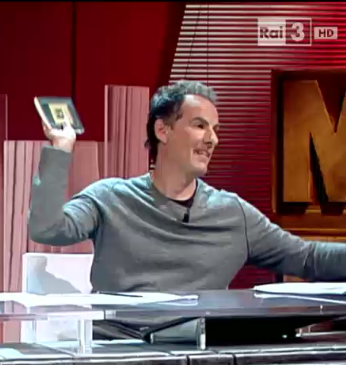 Masterpiece - Throwing a book (screen shot, Nov 24, 2013)As soon as the first episode of Masterpiece was over last Sunday, polemics started in the Italian press - yet the show didn't do badly in a country where readers are few and far between: almost 700,000 viewers for a 5,14% share, pretty good considering it airs very late, starting at 11 pm. Reactions on Twitter were numerous (see here) and ranged from positive to frankly negative ("it will generate so many small monsters"). Essentially, the critics felt that what was wrong with the show was that it didn't talk enough about literature: it was too much like Masterchef, the current popular talent show for cooks (!).
Masterpiece - Throwing a book (screen shot, Nov 24, 2013)As soon as the first episode of Masterpiece was over last Sunday, polemics started in the Italian press - yet the show didn't do badly in a country where readers are few and far between: almost 700,000 viewers for a 5,14% share, pretty good considering it airs very late, starting at 11 pm. Reactions on Twitter were numerous (see here) and ranged from positive to frankly negative ("it will generate so many small monsters"). Essentially, the critics felt that what was wrong with the show was that it didn't talk enough about literature: it was too much like Masterchef, the current popular talent show for cooks (!). As the Corriere della Sera noted, literary discussions aren't the point of the show: it is about writers not books; television needs people not words. There was one thing the show did achieve, and this was noted by several commentators: it managed to demolish the widely-held assumption that anyone can write a book, that all you have to do is sit down in front of a computer. The writing test that follows the "full-immersion" experience showed this, almost painfully as the writers struggled to produce something that could be deemed literary within half an hour.
The second episode aired last night (Sunday 24 November) confirmed that this was indeed at the heart of the show: this time the full immersion experience took place at a Neapolitan wedding and a soccer game played by blind people. The four aspiring writers were profoundly diverse, ranging from a young, cool female psychologist to a mature Don Juan lawyer, a self-assured older woman (age 66) and retired schoolteacher, a Serb shopkeeper, a mountain of a man who looked like a truck driver with frizzy hair.
 Nikola Savic, a writer from Belgrade (screen shot)The test of writing about their experience made it immediately clear who would make it and who wouldn't - at least to me and I'm sure this was so for anyone watching. It was the big one with frizzy hair, Nikola Savic, a refugee from the Balkan wars, an ex-Yugoslav. Even though Italian is a second language for him, there was strong pathos in what he wrote about the experience of going blind (that had been the jury's request).
Nikola Savic, a writer from Belgrade (screen shot)The test of writing about their experience made it immediately clear who would make it and who wouldn't - at least to me and I'm sure this was so for anyone watching. It was the big one with frizzy hair, Nikola Savic, a refugee from the Balkan wars, an ex-Yugoslav. Even though Italian is a second language for him, there was strong pathos in what he wrote about the experience of going blind (that had been the jury's request). What was remarkable about this episode is how much the Masterpiece producers seemed to have learned from the errors in their first airing.
First, they've cut back on the section that introduces the contestants; it's shorter and more fun to watch. A full 15 minutes was lopped off (the show now ends at 12:15 pm). The reading by the contestants of excerpts from their novel that was rather boring and incomprehensible, has now been reduced to a few lines that run at the bottom of the screen, a great help in understanding as some contestants tend to have very heavy accents. The off-screen commentator expedites what we see and the selection of the 4 contestants for the "full-immersion experience" now comes early in the show.
Next, for the "elevator pitch" test, they've introduced a literary celebrity, Walter Siti, a winner of the 2013 Premio Strega the most prestigious literary prize in Italy, with his book "Resistere non serve a niente". Walter Siti, after the pitch, sat down with the jury to discuss the two contestants books that he had actually read and helped the jury decide. This brought considerable clarity to the selection process...And no surprise here, Nikola Savic was selected to be among the 12 finalists to be considered for the Masterpiece prize (the winner's novel to be selected by Bompiani for a first 100,000 copies print run).
Finally, with short messages off screen, they've reminded viewers giving all the related web addresses: to read the contestants' novels, tweet (hashtag #masterpiece) and Facebook (here). The presence of the show on the web is definitely on the rise: the number of "likes" has doubled in the last three days and stands now, as I write, close to 4200 likes.
Can we declare the show a success?
I think it's getting there. Even though the writers' behavior on the show is rather civil (lots of embraces, but then we're in Italy!), Masterpiece has successfully maintained its harsh reality show nature. This was particularly noticeable this time at the end of an interview that had gone badly for the contestant. She had provoked the jury, refusing to tell them what she did for a living (she was an administrative assistant in a clinic), contending that only her book mattered. And from there, the interview had quickly degenerated in a battle of words, ending with her book thrown at her as she walked off - quite literally, a full arc across the stage (see my screen shot). And she was of course, given a chance to rebuke the jury for their reaction: "Next time," she said, "instead of throwing me a book, De Carlo should throw me flowers!"
As always, the final verdict will come from the audit ratings, and for the moment the show is suffering possibly because the first episode wasn't good: it got 633.000 viewers, some 70,000 less than the first episode, for a share of only 3,91%. However, it isn't game over yet. The Corriere della Sera, in its culture page this morning, gave the show its approval: "fewer contestants, more writing" (see here).
Ten more episodes are planned, we'll see how it goes - I will keep you posted!
If you want to see the episode, you can view it here.
Related articles
 Masterpiece: Italy's new literary talent show(acis.org.au)
Masterpiece: Italy's new literary talent show(acis.org.au)
 A dose of reality for literary events(theguardian.com)
A dose of reality for literary events(theguardian.com)
 Tired Metaphors? Ciao, Contestant!(nytimes.com)
Tired Metaphors? Ciao, Contestant!(nytimes.com)
 Novel Writing as TV Competition(karavansara.wordpress.com)
Novel Writing as TV Competition(karavansara.wordpress.com)










Published on November 25, 2013 04:31
November 22, 2013
Italian Public Administration: The Bureau of Insults

This is an announcement that was put up in a Rome city office a few days ago, informing our good Roman citizens (quick translation):
The public will be received every day Tuesday and Friday from 10 am to 12 am provided an appointment has been taken by telephone, the other days we must work. You are invited not to insist otherwise we will be forced, even though this is contrary to our education, to curse and cover you with insults.
Strong words...Ah, when civil servants become uncivil, there's no saying how far they will go! Needless to say this was quickly taken down but not before it reached the newspapers...
(Source of image: Il Messaggero , 19 November 2013)










Published on November 22, 2013 00:30
November 21, 2013
Are We Headed For Secular Stagnation?
 What we are living through now in our so-called wealthy, developed world - intractable unemployment, weak consumer demand, banks unwilling to lend, low economic growth and even periods of contraction - could go on for decades, perhaps indefinitely. That dire situation is what economists call secular stagnation, a terrifying, dismal notion that only radical economists have held so far. But the concept of secular stagnation, or permanent slump, has suddenly gone mainstream when Larry Summers elaborated on it in his presentation to the IMF Conference on November 8, suggesting we were on our way to become like Japan (see here, there's a video of his talk). He noted that even the bubble that preceded the 2008 crash wasn't enough to produce any real excess in aggregate demand. We have fallen into a persistent "liquidity trap".
What we are living through now in our so-called wealthy, developed world - intractable unemployment, weak consumer demand, banks unwilling to lend, low economic growth and even periods of contraction - could go on for decades, perhaps indefinitely. That dire situation is what economists call secular stagnation, a terrifying, dismal notion that only radical economists have held so far. But the concept of secular stagnation, or permanent slump, has suddenly gone mainstream when Larry Summers elaborated on it in his presentation to the IMF Conference on November 8, suggesting we were on our way to become like Japan (see here, there's a video of his talk). He noted that even the bubble that preceded the 2008 crash wasn't enough to produce any real excess in aggregate demand. We have fallen into a persistent "liquidity trap".As Krugman so ably pointed out in a series of fascinating posts on his NYT blog (read this one here, particularly illuminating), the "normal rules of economic policy don't apply", and "virtue becomes vice and prudence becomes folly". The times have come when, as Keynes famously suggested, it is better to bury money in coal mines and dig it up, paying workers in the process, than do nothing. Or, in Krugman's words: "spending is good, and while productive spending is best, unproductive spending is still better than nothing."
I love his advice to boost the economy. He says, suppose "U.S. corporations, which are currently sitting on a huge hoard of cash, were somehow to become convinced that it would be a great idea to fit out all their employees as cyborgs, with Google Glass and smart wristwatches everywhere. And suppose that three years later they realized that there wasn’t really much payoff to all that spending. Nonetheless, the resulting investment boom would have given us several years of much higher employment, with no real waste, since the resources employed would otherwise have been idle."
So what or who are the culprits?
For Summers, it's the zero nominal interest rate used by Central Banks that hasn't led to any increased lending by banks and won't. Krugman sees more culprits:
chronic trade imbalances, and there's no denying that the US has moved since the 1980s from a massive surplus to a massive deficit country in its current accounts...and I can think of Germany and China whose remarkable economic growth is rooted in exports and not in internal consumption; a shrinking working age population, like in Japan;even a "Bob Gordonesque" decline in innovation. Personally I don't believe much in that last one, human creativity cannot be squelched, even in bad economic times.
In a Monthly Review article titled "the Endless Crisis" published in May 2012 - thus much earlier than the current brouhaha over stagnation - further causes were suggested, including:
the decline in manufacture and decreasing utilization of productive capacity;the increasing share of GDP going to finance, insurance and real estate, at the expense of the goods-producing industries;the increase in the markup of prices over unit labor costs, which means that the share of labor in the economy has now reached a historical low since World War II. I'm convinced that this could be the crux of the matter: indeed, the authors of the article write "A central cause of this stagnation tendency is the high, and today rapidly increasing, price markups of monopolistic corporations, giving rise to growing problems of surplus capital absorption." Total revenue from the largest 500 corporations in the 2004-08 period was equal to 40 percent of world income. Collect the stats, you'll always come up with the same worrying picture of globalization of monopoly capital: big corporations are sitting on piles of cash that they don't know what to do with.
That article, by the way, was written by two respected economists, John Bellamy Foster and Robert W. McChesney. It was in fact an introduction to their book by the same title, see here, a must read for anyone concerned by the "Great Stagnation".
I believe however that those astute, sophisticated analyses by celebrated economists are so complex that they tend to hide the obvious. The authors of the "Endless Crisis" do try to make it clear when they write:
"Entrenched and expanding monopolies of wealth, income, and power are aimed at serving the interests of a miniscule portion of the world population, now known as the 1%—or the global ruling classes of contemporary monopoly-finance capital. The world is being subjected to a process of monopolistic capital accumulation so extreme and distorted that not only has it produced the Great Inequality and conditions of stagnation and financial instability, but also the entire planet as a place of human habitation is being put in peril in order to sustain this very system".
This is very suggestive but still couched in obscure economic language that doesn't help the debate. Yet, what is happening is really very simple: weak consumer demand and persistent unemployment are the result of income inequality. A good argument could be made that there is such a strong temporal coincidence between the three factors - all rising together since the 1980s - that a causal relationship between them cannot be excluded. And should be investigated. Intuitively, it makes sense: the One Percent cannot possibly boost a major macroeconomic variable such as national consumption all by itself. A boost must come from the 99 Percent, in particular from a massive, affluent middle class otherwise it won't budge. If the middle class is growing thinner and smaller - and that is the way it looks now - nothing much will happen.
Hence stagnation.
Sorry about that. This is a dismal post, but then, economics was always known as the "dismal science"...
(Source of chart reproduced from Monthly Review article: Data for U.S. from Bureau of Economic Analysis, National Income and Product Accounts, Table 1.1.1. Percent Change from Preceding Period in Real Gross Domestic Product, http://bea.gov/national/nipaweb/Selec... Data for Japan and the European Union from World Bank, WDI database http://databank.worldbank.org.)
Related articles
 Resisting Stagnation and the New Dark Age(dliwcanis.wordpress.com)
Resisting Stagnation and the New Dark Age(dliwcanis.wordpress.com)
 Deflation, Stagnation and Vast Money-Printing Operation Fueling Tensions, Creating Conditions for Another Global Financial Crisis(rinf.com)
Deflation, Stagnation and Vast Money-Printing Operation Fueling Tensions, Creating Conditions for Another Global Financial Crisis(rinf.com)
 Monetary and Fiscal Implications of Secular Stagnation(krugman.blogs.nytimes.com)
Monetary and Fiscal Implications of Secular Stagnation(krugman.blogs.nytimes.com)
 Larry Summers gives us the bad news. Worse, the only solution is more of the same.(fabiusmaximus.com)
Larry Summers gives us the bad news. Worse, the only solution is more of the same.(fabiusmaximus.com)










Published on November 21, 2013 00:58
November 19, 2013
Has the Fall of Facebook Started? What it Means for the Future of Social Media
 A recent study by the Pew Internet and American Life Project revealed that among younger users of Facebook, those aged 18 to 29, a crucial demographic for the future, 38%, that is well over a third of users said they would spend less time using the site this year. And a majority of users was found to have taken at one point or another, long breaks from Facebook, adding up to several weeks off the site.
A recent study by the Pew Internet and American Life Project revealed that among younger users of Facebook, those aged 18 to 29, a crucial demographic for the future, 38%, that is well over a third of users said they would spend less time using the site this year. And a majority of users was found to have taken at one point or another, long breaks from Facebook, adding up to several weeks off the site.Are we suffering from Facebook fatigue? Has the fall of Facebook started?
Some bloggers who loved Facebook when it first became big around 2004 (already ten years ago!) are expressing disappointment. They say it has "lost its edge" when everyone and his uncle came on board, and games on the site have become boring. Game and app developers, like Angrybirds, are going to Google+, eschewing the Facebook platform. A growing number claim they no longer need Facebook, that Google+ looks better and that they get more interesting news from Twitter.The New York Times also took note, saying Facebook may be "losing its cachet" (see article below).
But all the analyses are fundamentally flawed. The NYT article, trying to sum up the situation, focuses on what it sees as an "app development" issue.
But that's not what is happening.
First, apps in the near future may no longer be needed if browsers can directly bring to you websites such as Facebook on your mobile devices without the use of an app. Google's Chrome already does this. And in some cases (I have seen it), the image definition of Facebook on Chrome is even better than on the app. This is a result of the new "responsive web design", allowing for fluid grids and flexible images that adjust to your screen.
So apps could be on their way out. It's happening on Chrome, it could soon happen on other browsers.
I think we are getting an inkling of the future in the surprising news about Snapchat, the latest and most sought-after start-up in the tech industry. Snapchat, a service that lets users send photo and video messages that disappear after they are viewed, reportedly (see here) is rejecting offers.
Hey, big surprise, it's not taking the money and running, like Instagram famously did! It brashly believes it can stand up to Facebook on its own.
Snapchat, a David against Goliath? Semil Shah, a Tech Crunch columnist and investor, believes it could (see here).
I'm intrigued, particularly since a similar story happens to be at the heart of my book "The Phoenix Heritage" that I wrote in 2010, the same year the founders of Snapchat were working on their service (it came out in 2011). In my book, the protagonist, Tony Bellomo, a young Italo-American geek, invents a social media network to compete with Facebook. He calls it the "Chat Club" (or ChatKlub in the new revised edition of the book that I am working on and that will soon come out).
There's an evident though totally involuntary connection in the name, although from a coding standpoint, Snapchat is totally different and comparatively simple, whereas my protagonist's ChatKlub was enormously complex: it assumed that users would be given the choice of masks to use and (if they so wished) hide behind when meeting "friends".
Curiously, both Snapchat and the ChatKlub share the notion that is the exact reverse of what Facebook is based on, i.e. a person's real identity. The focus is on WHAT is exchanged, i.e. on enjoying the act of information exchange and not on WHO does the exchange.
This is a game changer: the act of exchange, the information itself, becomes the objective of social interaction, the message comes forward while the messenger retreats into anonymity. The idea is no longer to build around your name a personal collection of photos and a list of links to things you "like", which is, bottom line, what Facebook is all about - a place where people use every means they have available to scream "me". They build up their own personal "brand". Incidentally, Facebook is not alone. Google+ does the same with its relentless focus on "identity" and "authorship"...All of which can become tiresome after a while.
Personally, I find it very upsetting that Facebook should control how long my interaction stays up on their site, i.e. sharing stuff like "my status updates", photos etc. They want it up there forever on their "timeline" and I don't. My privacy settings could change overtime and I want control over that, something Facebook doesn't allow (if you want to delete your past, you can but it's hard work).
Snapchat has gone to the other extreme, messages disappear soon after they're viewed (though you could, theoretically, take a screen shot). That particular "ephemeral" feature could (eventually) spell Snapchat's downfall too: it appears that much of its success comes from exchange of sexual content and it is easy to see how that could lead to improper use. And it certainly works to limit Snapchat's appeal among responsible adults.
Still, looking at the broader picture of what's happening in social media, we are beginning to realize that, like in Grimm's tale "the Emperor's new clothes", Facebook may not be, after all, about socializing. If you want to stay in touch with your real friends, you pick up the phone or email them directly...
What's your opinion, do you think there's space next to Facebook for a network focused on content rather than brand building, on WHAT rather than WHO?
(Source of image: logos on wikimedia and David and Goliath illustration on http://leopoldmethod.com.au/attack-fr...) Related articles:
 Facebook Strives to Keep Its Cachet(nytimes.com)
Facebook Strives to Keep Its Cachet(nytimes.com)
 Dealing With Facebook Fatigue(adambagnallblog.wordpress.com)
Dealing With Facebook Fatigue(adambagnallblog.wordpress.com)
 Angrybirds Skips Facebook, Goes to Google+(epicagames.com
Angrybirds Skips Facebook, Goes to Google+(epicagames.com
 Are app developers growing tired of Facebook?(smartbrief.com)
Are app developers growing tired of Facebook?(smartbrief.com)










Published on November 19, 2013 07:14
November 18, 2013
Masterpiece: Can a Reality TV Show Help Writers and Boost Reading?

The Jury: Taiye Selasi, Andrea De Carlo, Giancarlo De Cataldo
Masterpiece, an Italian TV Reality show on Rai 3, a ground-breaking experiment to discover the Next Big Writer and boost reading in Italy, was on last night (I announced it on my blog last week, here). I watched it, fascinated, through the hour and a half it lasted (including publicity clips, among them one from Amazon for its Whitepaper Kindle - remarkably, nothing from Kobo although it is present in Italy in all major libraries).
I kept wondering how they would manage to inject TV glamor in an industry that is quintessentially conservative, intellectual and remote. That remoteness is also congenial to writers who are solitary souls that tend to communicate only through the written word.
Can writers be taught to communicate visually?
Rai 3 really tried. First, the jury was not just constituted by heavy-weights on the Italian literary scene, it also included beautiful Taiye Selasi, an American of Nigerian and Ghanaian origin, who is also a rising international literary celebrity and considered one of the top 20 'writers under 40' in the world (she happens to live in Rome). The jury, visually smashing, was presented at the opening of the program like Hollywood stars to the beat of rousing music. Well done!
The role of Massimo Coppola as a coach also came through with effective snippets, showing him giving emotional support and technical advice to the competing writers (70 had been pre-selected from 5,000 applicants). Poor writers, they were certainly under pressure and needed his support: the jackpot is any writer's dream, to be picked up by one of your country's major publishers (Bompiani) and be given a first print run of 100,000 copies!
The pressure showed, there were arguments and even breakdowns and repressed tears, victory signs for the winners and dashes out of the room for the losers... Because of the 8 writers who turned up for this episode, only one was selected to remain in the race. One thing for certain, Italian writers, even intimidated as they were, showed that they shared in the national ability to express feelings operatically. The jury too had its moments of fury and rants. I wonder if such a show would be quite as colorful if done in another country where citizens are more staid.
So was it a rousing success?
Not quite. I believe it could be improved. The first part - it lasted about 20 minutes - didn't work well at all and my husband got annoyed and walked out of the room. I wonder how many other viewers the show lost this way. Why? Because we were being shown snippets of the audition process to select the contestants, and it was not at all clear on what basis the contestants were selected. Excerpts were read by their authors and badly read - plus the stuff sounded like really bad literature (though it is difficult to judge when everything happens at an accelerated pace). In short, the selection process was boring and lacked transparency.
However, the show was saved by its second and third part. In the second, the chosen contestants were thrown into unexpected situations and told they would be given half-an-hour to write about it in the third part of the show.
Two of them were sent off to a refugee home run by a Rambo-type priest and the other two were invited in a "balera", an old-fashioned disco for senior citizens, dancing to 1950s and 1960s tunes. The camera followed them in these visually interesting experiences and then showed them hard at work to write their report.
The ensuing process of selection was suspenseful and credible and the last part of the show, an "elevator pitch" was well done and fun to watch. The last two contestants still in the running were, quite literally, shown into an elevator to pitch their book in 59 seconds as the cabin whizzed up, with Elisabetta Sgarbi, the Editor-in-Chief of Bompiani, listening - an impressive woman with a beautifully chiseled face and black eyes who stared at them, as unemotional as marble. You suddenly got an
amazingly clear idea of what kind of book they had written; the authors were two very different types, a gaunt young man and a mature, florid woman. Of course, only one (the gaunt young man, Lilith di Rosa) came out of this ultimate and harrowing test that we, as writers, only know too well.
Conclusion? I think something must be done to improve the first part of this show - I am not quite sure what, but as it is, it doesn't work. Perhaps it should be skipped altogether and we are immediately presented with the four contestants and the obstacles they must overcome.
The idea of throwing them in a situation and force them to write about it afterwards in 30 minutes really works. Sure, some of the contestants weren't happy about it, arguing that the writing process needs time and isolation and cannot be done in public under the glare of TV cameras. True enough. It is obvious that a reality show isn't for everyone. If you can only write in the peace of your bathroom, well, don't sign up for a reality show!
I know that some of you who read me also live in Italy and may have watched this show. Please be sure to comment, I'd love to have your opinion! I know of one writer (see article below) who argued that the idea of a reality show was a bad one because personal embarrassment was a key feature of such shows. I agree that there would be no pleasure in seeing an aspiring writer "humiliating" himself to get a book deal, but that is not what happened here. Nobody was humiliated, the losers were simply told to walk out. Which is as it should be, and none of them protested afterwards, they took it gracefully as shown in their comments, very democratically picked up by the camera.
Incidentally, the Italians seem to prefer to call it a "literary talent show", not a reality show, see here... I like that, thumbs up! For reactions from viewers as the show was unfolding last night, go to the Masterpiece Facebook page, here.
Related article
 A Reality Show for Unpublished Authors(dysfunctionalliteracy.com)
A Reality Show for Unpublished Authors(dysfunctionalliteracy.com)









Published on November 18, 2013 01:58
November 15, 2013
Masterpiece: An Italian TV Reality Show for Aspiring Writers
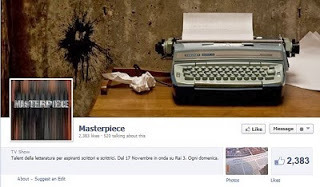 Masterpiece Facebook Page (Screenshot Nov 15, 2013)This Sunday, 17 November 2013, could mark a watershed for writers living in Italy. This is a country where more and more books are published and fewer and fewer people read. A book that sells 10,000 copies is considered a best seller.
Masterpiece Facebook Page (Screenshot Nov 15, 2013)This Sunday, 17 November 2013, could mark a watershed for writers living in Italy. This is a country where more and more books are published and fewer and fewer people read. A book that sells 10,000 copies is considered a best seller. Somebody who's not afraid to pull writers out of their ivory towers, has decided to throw them together in a reality TV show on State Television, Rai 3. Massimo Coppola is the show's host, three best-selling novelists form the jury, here they are:
And here's a video with the contestants breathlessly lining up, hoping to be selected. Fully 5,000 of them turned up but only 70 were selected to compete against each other down to the last drop of... ink!
The winner will get his book published by Bompiani, a major Italian publishing house. A first print run of 100,000 copies is optimistically planned, no doubt counting on the visibility provided by Reality TV.
Who knows, it could very well prove to be a good bet. If it succeeds in reviving interest in books, more shows are planned to follow and go abroad, and maybe cross the Atlantic. The New York Times has already taken note (see article below).
Those of you who speak Italian, make sure you don't miss the show, it starts on Sunday on Rai 3, in the second part of the evening program. I know I will watch it, I'm truly intrigued to see how writers who are notoriously solitary and shy will manage under the glare of TV lights!
Related articles
 Tired Metaphors? Ciao, Contestant!(nytimes.com)
Tired Metaphors? Ciao, Contestant!(nytimes.com)
 Book News: Italy Has A New Reality Show - For Writers(thedailyblogreport.wordpress.com)
Book News: Italy Has A New Reality Show - For Writers(thedailyblogreport.wordpress.com)
 Tired Metaphors? Ciao, Contestant!(nytimes.com)
Tired Metaphors? Ciao, Contestant!(nytimes.com)










Published on November 15, 2013 07:20
November 14, 2013
Income Inequality is Exploding: How Dangerous is it?
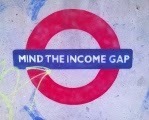
We've all heard about income inequality and how the recent Great Recession of 2008 has made it even more dramatic.
We also know that the rich in America have recovered several years before unemployment started to finally budge (slightly) downwards.
By 2010, fully three years ahead of everyone else, the ultra rich were okay again and enjoying life.
We live with that knowledge without fully realizing the extent of the inequality. Here's an amazing video that really brings it home:
Don't think this is an American story. What's happened in America has happened around the world. Here's the case of the UK:
And here's an attempt to look at the problem globally:
When reading the many comments to the videos on YouTube, what strikes me most are three things:
1. the idea expressed by many that envy is driving some rabid leftist people to put false information together when that is not the case at all. The data is based on cold, unemotional income/population statistics, things like the Gini coefficient.
2. The surprising fact, rarely pointed out though it deserves to be, that inequality is getting worse: at the time of the Industrial Revolution, the richest countries were (roughly) three times as rich as the poorest. By the time the colonial period was over (in the 1960s), the richest countries were 35 times richer, and now they are 80 times richer. The trend towards more inequality worldwide is obvious.
3. Linked to this, is the idea put forth by many that income inequality, if talked about
too much, will cause social unrest. So better keep mum, don't rock the
boat.
To be honest, I'm surprised that social unrest has been so muted. Where have all the Occupy Wall Streeters gone? Sure, there are recurrent explosions of discontent in Southern Europe caused by austerity programs imposed by the infamous "troika", the IMF, the European Commission and the European Central Bank. A series of International Policy Digest articles gives you a good overview of this (click here).
Can we expect our world to be permanently divided so that social unrest becomes the norm? That the streets of our cities will be the scene of recurring civil war?
Quite frankly, I don't think so. The ultra rich have already learned to be discreet about their wealth and that is certainly something they will keep doing in future, perhaps even more so than now. And many already live in gated communities and walk around with bodyguards...
Also, consider that a truly unequal society is likely to face economic stagnation.There will come a time when consumption will stop driving the economy because there is only so much that the ultra rich can spend on their own consumption. What will they do with their extra money? Why, they will spend it on technical gadgets and fancy innovations and they will play on Wall Street, the more derivatives, the better!
Hum, I wonder whether much of all this hasn't already happened? Yet we haven't had a truly bloody revolution in the 1789 French style...
My bet is that we won't have it. Some skirmishes? Yes. A revolution? No.
And the ultra rich will eventually become the only ones to enjoy the full benefits from technical advances in the green, rural comfort of their protected homes while the rest of us sink in the miasma of polluted, over-crowded cities...That, at least, is my vision of the future 200 years from now - that future I describe in my soon-to-be published novel "Forever Young".
What do you think? Are we headed for a full revolution or sporadic and limited social unrest?
PS: My thanks go to one of my readers who pointed me to the video about income inequality in America.
(Source of image: Wikimedia)
Related articles
 Both China and the US have income inequality at levels where there is high risk of potential social unrest(nextbigfuture.com)
Both China and the US have income inequality at levels where there is high risk of potential social unrest(nextbigfuture.com) OECD / Countries with greater skills inequality have higher income inequality(jobmarketmonitor.com)
OECD / Countries with greater skills inequality have higher income inequality(jobmarketmonitor.com) The Geography Of Inequality(dish.andrewsullivan.com)
The Geography Of Inequality(dish.andrewsullivan.com) Robert Reich's "Inequality for All"(topofjcsmind.wordpress.com)
Robert Reich's "Inequality for All"(topofjcsmind.wordpress.com)









Published on November 14, 2013 02:11
November 12, 2013
Is Boomer Lit a New Genre or a Category? And Should it Matter?
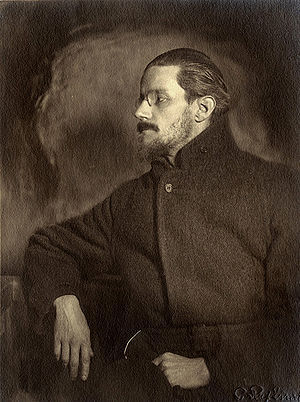
I just came across the blog of an author who vehemently argues that Boomer Lit is not a genre, that it is a category (see here). She claimed that since genres are theme-centered (e.g. romance, science fiction, thrillers etc.) the term could not apply to Boomer Lit that is age-centered on all those born between 1946 and 1964.
My first reaction was so what?
My second reaction was, I don't agree that Boomer Lit is exclusively focused on Baby Boomers. It's a way of thinking. It transcends this question of date of birth, which is about demographics and not literature. You can be older or younger and still be interested in Boomer Lit. Why, on Goodreads, I came across a 15 year-old fan of Deborah Moggach's "The Best Exotic Marigold Hotel"!
My third reaction was, yes, there's something in this. Perhaps the term "category" would help readers. Genres were devised by the publishing industry to guide readers but there are so many genres and sub-genres that they seem designed to confuse.
So, for the sake of argument, let's set aside for a moment both the term "genre" and "category" and agree that fiction can be divided into two big classes of books:
1. theme-centered: romance, historical, thriller, science-fiction etc. There are of course sub-genres. For example for romance, you find the sub-genres of paranormal romance, historical romance etc...
2. age-centered: the most famous age-centered genre is Young Adult or YA Lit (for the 14-18 age group), the most recent one is New Adult (for the 19-29 age group). Many theme-centered genres fit under the YA Lit and New Adult headings, thus further helping readers fine-tune their search for a favorite read.
Boomer Lit fits right here, and like YA Lit and New Adult, it spans over a range of genres, from romance to memoirs. And like them, the explicit reference to an age group does not mean that an author has to be born between 1946 and 1964 to qualify as a Boomer Lit author.

A lot of people I know who write successful Boomer Lit are NOT Baby Boomers. Indeed, they are often born in the 1970s - not later really, because to write Boomer Lit, you need a lifetime of experience and the capacity to understand that life is marked by major turning points and the empathy needed to write about it. A perfect example is Rachel Joyce's "The Unlikely Pilgrimage of Harold Fry", a debut novel long listed for the 2012 Man Booker Prize. Joyce's protagonist is a 65 year-old man, she is in her forties!
While YA Lit deals with "coming of age" stories, Boomer Lit addresses the last major turning point in life: you leave behind a life-long career or a life-long relationship. As a result of this storm in your life, you finally discover who you really are, something that was often unclear or obfuscated by daily work routines or a monotonous marriage.
Great literature is characterized by the focus on major life issues, on epiphanies à la James Joyce, and surely the last turn in one's life is such a one.
The last epiphany before entering old age is what is at the heart of Boomer Lit.
Now, if one prefers to call YA Lit a "category" in order to distinguish it from theme-related genres, why not? I have no problems with that label.
The only trouble is that the publishing industry does not normally do this and maybe they should. It would certainly help avoid confusion!
What do you think? What label best expresses what Boomer Lit is about? And how can we move away from the age group concept and focus on what is really at the heart of Boomer Lit ?
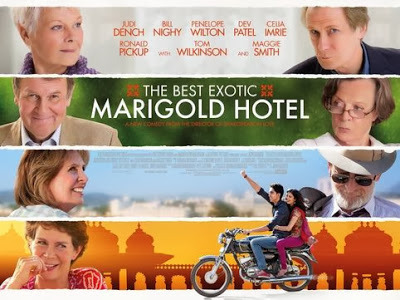
(Photo credit: James Joyce; The Best Exotic Marigold Hotel)










Published on November 12, 2013 01:32
November 10, 2013
A Mystery Swiss Cheese: Schabziger and What To Do With It

I
recently received from a Swiss friend who stayed with me in our house
in Umbria a lovely gift: two little forms of green Schabziger, a mystery
Swiss cheese made in the Glarner mountains, following a 550-year old recipe.
And it's not made anywhere else!
Today, there is only one manufacturing plant for this cheese, in the canton of Glarus, run by Geska A.G. since 2000.
It
comes in very small forms, each only 100g, and here it is, looking
smart in its classic green and white box, I remember it from the time I
was a kid (and I won't tell you how long ago that was!):

It is a dry, skim cow milk cheese flavored with a special herb called blue fenugreek that is (surprisingly) also widely used in Georgian cuisine. The plant blooms in June and looks very pretty:

Schabziger
reportedly was first made by monks in the 8th century. The exact
specification on how to make this cheese was laid down during a cantonal assembly
in 1463. From that year, the cheese bore a
stamp of origin, making it one of the earliest protected brands in the
world...And you thought the Swiss only made watches!
This
so-called "green Swiss cheese" is in fact little known outside of
Switzerland. The only two countries where it sells are Germany and the
Netherlands though it is commercialized in the United States under the
brand name of Sap Sago.
A weird name, Sap Sago. Nobody knows why, possibly a corruption of the way the name sounds in
German or a reference to "sap" as in tree sap, the vital lymph.
Apparently it was brought to America in the 19th century and sold in New
York pharmacies. Thus, it was presumably seen as having a medical value -
which indeed it has, since it is very low in fats. But that may also be a
reason why its use has remained limited, since it was associated with
medical use rather than seen as a normal food.
The normal use: grate it and mix it with butter, spread on your bread. But I
thought there should be other ways to use it. I googled some recipes and
the best site I came across is this one run by Geska, click here to see the website and here to download their best pdf brochure (there are several).
An experimental recipe:
I thought I'd experiment, using Italian products like Mascarpone. One
obvious use for Schabziger is to sprinkle it over Fettucine all'Alfredo,
replacing the grated Parmesan. But I thought I'd try it over boiled
potatoes. So here is the dish I concocted last Sunday, really simple to
do:
Ingredients for 4 persons
1 form Schabziger, grated
5 medium-sized potatoes, boiled and peeled
150 g Mascarpone (or any other available cream cheese)
butter
1 clove garlic, peeled
grated nutmeg
breadcrumbs (as needed to cover the dish)
pepper and (optional) very little salt (remember the Schabziger cheese is salty even though the Mascarpone isn't)
Method:
1. Rub a pyrex dish (that goes in the oven) with a garlic clove, then butter it.
2. Slice the boiled potatoes (thick slices) and lay in the dish
3. Mix the mascarpone with enough milk to make it a little creamier and add the grated Schabziger and a pinch of nutmeg
4. Cover with breadcrumbs and dot with butter
5. In a warm oven for ten minutes, then turn on the grill until a golden crust is formed.
Here it is, enjoy!

Tastes great, it accompanies beautifully any roast meat and is even good by itself with a nice glass of red wine!
NOTE: This post comes from my Cooking Blog. You can find more recipes and tricks in cooking there, just click here. I like to share the recipes I test and make up, and then I keep track of them on that blog...
(Photo credit: the Braunwald Alps, click here)










Published on November 10, 2013 10:01
November 8, 2013
The Global Fund for Forgotten People: A New Player in Humanitarian Aid

Order of Malta coming to the aid of "forgotten people", here giving coats to the homeless in Barcelona
Launched six months ago by the Order of Malta, the Global Fund for Forgotten People has just begun gathering funds and so far, with a modest $245,000, it has already helped 17 projects around the world: an amazing feat!
Most charities gather funds and then waste time to spend it, trying to figure out exactly what to do with the funds. Okay, I hear you sniggering, a lot of them put money in their pockets, and yes, I've blogged about this before (see here). But the Order of Malta has been involved in emergency and humanitarian aid over the past 900 years, longer than anyone else in the charity business. And they have associations and groups working for them everywhere on the ground, over 100,000 persons are involved world-wide. For them, finding aid projects to assist is a no-brainer, the structures for project delivery are already in place.
So what exactly has this new Global Fund done in the 6 months since it became operational? Click here to read their latest newsletter. The projects are far-flung around the world and systematically come to the aid of the poor and emarginated, i.e. the "forgotten people", inter alia, for:
Syrian refugees: a socio-medical center Lebanon;
immigrants landing in Europe on island of Lampedusa: assistance (started long before the scandal hit the news this summer);
the elderly: (1) meals on wheel in Lithuania (2) Kitchen for Life - food program in Ukraine; (3) Centre of Health and Welfare in Peru; (4) Day Shelter in Chile;
the homeless : (1) Day shelter for the homeless in Belgium; (2) Mobile shelter in Russia;
victims of violence and human trafficking: Shelter in Poland ;
people with HIV/AIDS: Care center in South Africa;
people with poor nutrition : vegetable gardens around hospitals for patients and their families in Togo and Benin;
children with disabilities: (1) Summer camp in Italy for children affected by the Chernobyl disaster (remember that one?);(2) Summer Camp for young disabled in Ireland; (3) summer camp in Hungary (4) kindergarten Romania; (5) Boarding school for at risk children in Mexico.
Here is the Grand Master of the Order when he recently visited that boarding school in Mexico. He is to the right of the photo and on the left you see the Grand Hospitaller, who is globally in charge of all the Order's health assistance:

The Global Fund's Facebook Page is full of interesting pictures and information, see here and "like" it (I did!).
The Global Fund is the latest tool set up by the Order of Malta to make it easy to contribute to aid for anyone who wants to.
Here is their website: www.forgottenpeople.org The Fund is registered as two legal entities - as a charity in England and Wales (1148427) and has 501(c)(3) status in the US (i.e. tax exemption as a charity).
To donate, go here. At least you'll know what your money is doing!










Published on November 08, 2013 06:23



